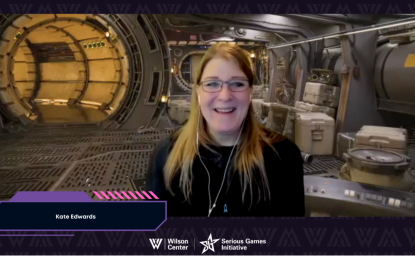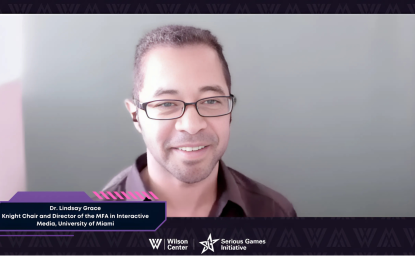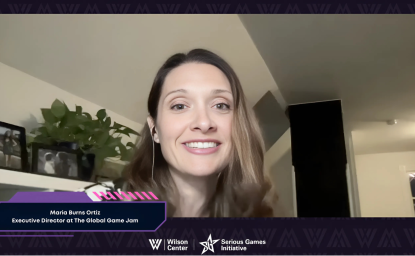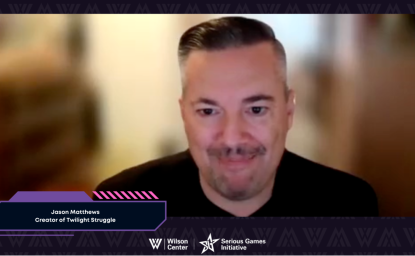Elizabeth Newbury:
Welcome back to another video from the Serious Games Initiative here at the Wilson Center. I'm Liz Newbury, and the Serious Games Initiative is celebrating over 20 years of developing and researching gaming as a means for social good. Throughout the decades, our approach has focused on amplifying science policy discourse and engagement through gaming with titles like Budget Hero and The Fiscal Ship, which focus on the federal budget and decreasing national debt, to our latest games that focus on everything from environmental policy, like our Plastic Pipeline game, and also our series of AI games, one on bias and AI system called AI's anatomy that's been up for a few awards, and a forthcoming game on deep fakes and mitigation. Stay tuned. We also support the broader field of practice, and one of the things that we wanted to do here with the 20th anniversary is take experts from the broader field of serious games to really examine the past, where will we come from, the present, what is happening now, and the potential futures of serious games and where they're going. And I have the distinct pleasure to be joined here today by Mark, and Mark, I'm going to ask you, first to introduce yourself and how you orient towards serious games.
Mark DeLoura:
Awesome. Sounds great. Well, thanks. Liz, it's really nice to see you, and thanks for asking me to come on. Always enjoy talking about this, especially with you, because you've been in this space more than pretty much everybody at this point. I'm Mark DeLoura. I'm an engineer by training. Grew up in kind of that VR era of the 90s. And yes, there was a VR era in the 90s for those of you. Yeah, I attended college here at University of Washington in Seattle, where I'm at right now, and grad school at UNC Chapel Hill. And both of those places at the time were part of the burgeoning 90s VR movement that lasted for four or five years. And I caught the bug, the idea that I could go into a world, I could create a world for somebody that and they could experience it, not just stare at it, and then it could have impact them in some ways, or like, that was it, was it for me. And like, how do I keep doing this? Of course, right after that, VR crashed and burned for the next 20 years. So I got into video games through some lucky accidents, being well trained in 3D from VR as an engineer, when the console game industry moved towards 3D I was well placed to help people out and encourage people to learn more about creating realistic worlds from VR and now in games. So I worked at Nintendo for about five years that N64 era, any N64 game you see.
Elizabeth Newbury:
The golden era of Nintendo, right?
Mark DeLoura:
Well, I think so. Yeah, I love all those games. I left there just as we were doing GameCube bring up. I ran game developer magazine for a year and then moved to Sony PlayStation. I was a PlayStation for five years as well, kind of from the mid PS two through PSP and PS three bring up. And then when I left there, I spent probably 10 years as head of technology at various game publishers, so Ubisoft and THQ and some startups and things, did a lot of consulting work, and then had a weird situation come up that wound up with me in the White House under President Obama, focusing on games so and that's what brought us to meet each other, just to close the circle, and then we can roll back around. I spent two years in the Obama White House as a Senior Advisor for Digital Media, focusing on games for impact, and also K12 computer science education. And since then, that's been about 10 years now. And since then, I've been focused on trying to find ways to get more people to do more with games, mostly games for learning, but games for impact broadly. But learning is kind of the part that's stuck in micro more than anything else, and so that's what I push mostly.
Elizabeth Newbury:
So thinking back to when you were hired in the Obama White House, decade or more. Now, what was, what was the spark for that? What was the catalyst? Why were they looking for a game person?
Mark DeLoura:
That's a great question. Well, there was a game in that time period called Foldit. And that game was a game about protein folding, which I'm sure you immediately think to yourself, that sounds amazing. I want to play that game right now. What the heck is protein folding? So what this game was, was complicated proteins fold up on themselves based on, you know, the molecules that have the atoms, and it's difficult to determine how they will fold, or how they have folded. So if you look out in the wild, you see some complicated enzyme, some complicated protein. We may know that that protein exists, but we do not have the capability to look at it and figure out how that protein is folded up, except with X ray crystallography, which is pretty much shooting X rays at a molecule and guessing at what's inside the molecule based on the ways X rays bounce off. So that works really well with simple molecules. For more complicated molecules that's really difficult and error prone. So what this game did was it trained players in how to solve protein folding problems from really simple problems. You know, kind of typical game style. We're going to scaffold you up, like through the simple folding and up through medium folding, and then the complicated ones are maybe things that exist in the world that we don't know about, like we don't really know how Lee six fold, but we're curious what you'll say. So the goal of this game, this was a game that was created by some folks from University of Washington and another place that I always forget the name of.
Elizabeth Newbury:
and they also recently won there some of the Nobel laureates, right?
Mark DeLoura:
Yes, yes, yeah. The guy who's at the University of Washington who was yeah, one of the people who won the Nobel Prize for Chemistry is, is one of the originators of this game Foldit. What made this game impactful was that somebody thought, what if I could take these complicated problems. We had problems right then with figuring out the structures of HIV related enzymes and proteins. And so they gave those, as you know, grow up problems in the game to the player base. And the player base like this one, one particular HIV related enzyme, the community of 10,000 players solved this structure of this enzyme in 10 days, and scientists had been trying to figure out for 10 years what it was, and this actually resulted in some medications related to HIV, so it had an impact in the world. All right, so that's a long story. So this, you know.
Elizabeth Newbury:
It's a good story, though it's a good story.
Mark DeLoura:
It is amazing, I think. And the fact that they just recently won the Nobel Prize, just like, Oh, that's so great. But how can we do more of that? That's the question, in different areas, in different ways, engaging players, you know, for citizen science or or whatever they're up to in their in their own life, are there ways that we can utilize games to encourage them to learn, you know, that foreign language they've always wanted to learn, or go out and explore the forest and learn about foraging. We teach that to them through a game, or, you know, anything like this. So the Obama administration that was a question on their mind, like, wow, look at Foldit. What else could we do? We don't really know. Who do we go to to explore this for us, and so they reached out to Constance. Constance was at University of Wisconsin, Madison. Constance Steinkuehler is amazing. She has a very academic focus. She was focused in this area. She came on board in the Office of Science Technology Policy, and was there about six, seven months. And really, like, pulled together the research community around this to try to see, like, what do you what problems do you see that we could solve? And hey, game research community, you know, how do we utilize your expertise? How do we, how do we work with you? I came on after Constance left, and I had more of a build-it focus. So she rallied the research community. I was like, how do it make stuff? How do I get game companies to get involved? How do I get the agencies to be interested in building these kind of things, and how do we fund them? And so I was there for about two years in the Office of Science Technology Policy, just to stir people up, try to get them filled stuff. So we had the Federal Games Guild, which is now under you at the Wilson Center. Which, thank you very much for that. That's been a great home. And just trying, trying to get agencies to take shots on goal, like, what are the difficult problems that you have? How can we use games to maybe make an impact for you? When I left, actually, Eric Martin came on after, after a bit of a gap, maybe six months or nine months, Eric Martin, who had helped me throw the first White House Game Jam, he came on, and he spent about two years in the same role. He had more of a player focus, which is super interesting. So he did things like work with Twitch to talk about the Affordable Care Act, things like this. So between the three of them, I think of us as an arc, maybe an inadvertent arc, but like research building and players was a great Triumvirate.
Elizabeth Newbury:
Yeah, it's, it's really interesting how this sort of shift happened over over time, and that focus of, well, first we need to kind of know what we're doing, right? Let's gather the researchers. And I should mention that Constance was also integral in creating the higher education video game Alliance. Yeah, and then you came on with more of the build it approach, as it were, which I think at the time, was also very much needed, because a lot of federal agencies needed a roadmap on how, okay, great, you've told us how great games are, but now, how can we implement them and, like, actually support them? So it is interesting to see that the arc and then the players are obviously also super important. One of the reasons why we're interested in games, right? If we're, if we don't have players, that's really all about, everything else doesn't matter. Yeah, so thinking of that sort of trajectory, have you, how is it in sort of fast forwarding to today? How is it sort of shifted, in your opinion, or how is it transformed over the years?
Mark DeLoura:
Yeah, I mean, you can go all the way back to the originations of this field, right? And so everybody talks about things like Oregon Trail and wearing the world's car in San Diego and Mavis Beacon Teaches Typing things like this as like games that also teach something. And this was 90s to early 2000s sort of the CD-ROM era of PCs.
Elizabeth Newbury:
CD-ROMs for the Gen Z watching, you know, are these little flat, shiny discs that we used to put into computers to load files.
Mark DeLoura:
Yep, that's what those are. Yeah, when they when they launched, it was a big deal, right? Was a game in that time period that really took advantage of the CD-ROM wouldn't have been as a game they really couldn't make before then. And I think, I think parents were looking for things that they could do with this technology for their kids at home. And so there were a lot of educational experiences, some of which were games, some of which were encyclopedias, you know, things like that. But so that was a moment in time five, seven years. It was a big hit, super popular, and then disappeared. And there was a lesson taken away from that by the broader entertainment focused game industry, which was, don't ever do that again, all those companies went out of business. And so apparently making education focused Games is a good way to go out of business. I think that was the takeaway. Unfortunately, 15 years past, 20 years past. So when we were coming on board and thinking about this and talking about this, there wasn't a whole lot really going on. There are definitely some things here and there. I've seen some games that had gotten me inspired. But there were, there were one offs, there were people experimenting and exploring. I think that then there was probably a period of again, five to seven years, maybe 10 years, where there was much more interest. And some of this coincided with us rallying at the White House. Some of it, hopefully we helped cause some of it. But getting philanthropy to put money behind things, getting agency grants, like the SBIR grants in place, the small business grants, those helped to really stir up the space a bit. MacArthur Foundation and Gates Foundation were really interested as well, and putting money behind it. So people who were interested in making games and were just in the space could see, like, all right, maybe there's a path to, if not profitability, at least revenue neutral. You know, I'm not going to go out of business, and I can try this out until more things were created. And also it was a moment at which mobile was mobile apps were starting to really take off. And so they were fairly inexpensive to make compared to other things out there. And so it was easier to take make experiments in this space. So I think there was a there was a lot of really great work done for, I don't know, 7-10, years. I feel like it's dwindled quite a bit now, and it makes me sad. There's still some but mobile is more expensive than it used to be to build on for a variety of reasons. Consoles still you just don't go there, and people don't even experiment because it's expensive and markets not really understood. Agency grants are still a great place, and the work you've been doing at the Wilson Center is fantastic.
Elizabeth Newbury:
And in fact, what we can link to some of those federal grant opportunities in our descriptions for this video on YouTube and wherever it lands on the internet.
Mark DeLoura:
Yeah, that sounds great. Like the ED games Expo, I think is probably one thing to really highlight, which is the it's an annual event that highlights all of the Games for Learning and adjacent games that were funded through Department of Education and sometimes also NIH NEA, Wilson Center,
Elizabeth Newbury:
We don't fund, but we were happy to create games other agencies have kind of gotten on board. Are like IMLS, that's Museum and Library Services, and CDC has actually also produced a couple of games recently. Department of State has also created a couple of games and game based initiatives. So there is a whole wide spectrum, but SBIRs are really, I think, some of the backbone of the industry, especially historically, and getting some of these small indie companies bolstered up for learning like, like you're saying,
Mark DeLoura:
Yeah, it's, I always kind of describe it when I, when I whinge and complain about how difficult the market is and how difficult it is to build things like this.
Take a deep breath, yeah. Well, what I always think about is like, it's, I love that people are taking making experiments, like, when I talk to a developer, and they're going to try to make a learning game. I just want to give them a big hug, like, you're the best. What I really want is for you to be able to make two, because I want you to make one and then not go out of business, and then you'll have learned a bunch of stuff, and the next one you'll make could be even more amazing. So like, how do we how do we bridge that gap? You know, we need to reducing the risk is a big part of this.
Elizabeth Newbury:
And one of the things that you and I have talked about a little bit is, it's a different variety to make a learning game, right? It's a different skill set. It's not just usability testing that you have to do for games, but you have to also make sure the learning is actually happening, right? So have you seen that change over the past couple of years?
Mark DeLoura:
Yeah, for sure. I mean, I feel like this was one of the things learned by the glass lab experiment. So so Glass Lab, Glass is short for games, learning and assessment, was an effort that was funded by MacArthur Foundation, Gates Foundation, Electronic Arts, ESA, the Entertainment Software Association, Pearson, I think scholastic got involved. There the acronym soup of interesting companies. What else am I forgetting? Yeah, some they funded this effort at and it was based at Electronic Arts. Electronic Arts offered a studio space and some game engine technology with the idea that they would be funded for three years through Gates and MacArthur to experiment with creating games for assessment, or mostly for real time assessment. So as you're playing a game, if the game is about math, how do I know that you've learned how to do multiplication, so that I know now that we're going to move on to division. You've already got that worked out. So that assessment system, so Glass Lab, one of the things that I think was a really strong takeaway from them was the importance of teaming up with teachers. Like it seems like a simple thing to say now, but yeah, the idea that you know, if you're an entertainment company making an educational game, you should also partner up with an educational expert. Vice versa, if you're an education expert and you want to make a game, you should try to partner up with a game development expert, and you'll end up with a stronger product. And finding ways to get if you're targeting K12, doing some curriculum alignment goes a long, long way, and it's a little complicated. So again, you gotta look for those experts. So I think, I think we've learned those lessons. That's one, one great thing I can point to over the years that I think is ingrained now in the field. I'm sure many more lessons to come.
Elizabeth Newbury:
Yes, and so looking to the future, the horizons of we've had some lessons learned behind us. What do you hope is the next step in the serious games, or games for learning field? What do you hope is on the horizon for it?
Mark DeLoura:
I've been mulling over this a lot lately. You know, I tend to shortcut when I talk about games for learning, that's really like all impact games for me, because I think at their core, games are learning machines. No matter what, whether it's teaching you to jump over a chasm and avoid the monster and kill the boss, or how to do math or speak Japanese or balance your checkbook, you're learning something, right? So this field, I think of as Games for Learning, that the challenges that we're at now, I think when I'm thinking about where we're going from here, it's their VR was really popular for a hot second, and so I got really excited coming from VR, that we were going to do some interesting things around learning in VR, but the hardware is still kind of expensive for classrooms. There's not an established market for learning products there. And if you go on to got a quest three over there, if you go on the quest store right now, you'll find a bunch of language learning related stuff, because language learning is something that companies have managed to be profitable at. So you'll find a bunch of it, it's you'll find a bunch of it that's not super awesome, and some that is pretty awesome. But, you know, I'll take what I can get. I'm glad people are experimenting and we're learning things. I think my dismay is that we're once again, at a point in time where making games expensive, and we don't have a storefront for learning games that works for teachers. We don't have easy integration to the LMSs for people who want to do K12. So I'm really left with a sort of I'm cogitating about informal learning again, and why is it that we're not at a position where, when somebody thinks to themselves, you know, I want to learn to be a better runner, they think I should download a game like zombies run. That's going to encourage me to run, you know, by doing sprints or or whatever I want them, because the zombies are chasing you, right? Zombies are chasing you, right? Yeah, this is audio game. If you haven't, if you haven't heard of it, pretty fantastic. But if you're doing something, you're trying to learn something, why aren't you going to the thing that makes learning more engaging and more straightforward? It's not in the zeitgeist, apart from language learning, where everybody's like, Oh, I gotta go download Duolingo or whatever, like this one we've got, right? People think about this. But why is it that it hasn't broken through in other places? There are plenty of things like adults want to learn in life. I want to learn how to build a table on a you know, saw in my garage. How would I do that? Well, I could use VR for that. I could use a visualization tool like something with Unreal, something with Unity, these 3D engines to teach me from the basics, the skills that I need to know so that then I can get and you know, my boss level is like making this table in person in reality. Augmented reality would help with that. VR would help with that. But they're, they're not necessarily fundamental to it. You can do it in 3D and it's the lands, but we haven't crossed the gap. So we need more experiments. We need more places for people to try these things. We need to find ways to reduce risk so people will build them. A little bit we've talked about a lot.
Elizabeth Newbury:
It reminds me when you're talking about the a lot of people go to YouTube nowadays, which we support. Thank you for watching this video, but we I think there's haptic quality that might be missing from that. So like in your example of how do I build a table, I can imagine a scenario where it'd be very helpful to have an augmented reality or VR headset where I can put that frustrating IKEA table together and not like, or at least see and like, be able to, like, walk around it, or something along those lines. Uh, similar with, like, STEM learning. It wouldn't it be so cool to do Foldit, but, like, with haptic qualities, right?
Mark DeLoura:
Yeah, it would be amazing. Or I think about, why isn't there an app that helps me learn to cook, and it does it from the very basics of cooking, and then adds, you know, different herbs and different techniques. And I can do it in the like, a Cooking Mama style VR game.
Elizabeth Newbury:
I was going to say Cooking Mama isn't enough for you?
Mark DeLoura:
I want the learning version of Cooking Mama that's got, like, the scaffolding.
Elizabeth Newbury:
And you want to have Julia Child right next to you, helping you make her COVID?
Mark DeLoura:
Yeah, I like this. Let's do it.
Elizabeth Newbury:
Awesome, yeah. Well, that that is a interesting like, look at the future, especially as we're at this intersection where, as you're pointing out, technology costs are a little high for for most people to have access to VR. But maybe in the future, we'll see that coming down, or AR improving, similar to what you saw with mobile gaming.
Mark DeLoura:
Yeah, it is an interesting moment right now because we the quest 3s came out. This video has come out maybe a couple of weeks after the announcement of the 3s which is a cost reduced, you know, new VR platform that maybe could be better for schools. There's experiments going on at Arizona, ASU, Arizona State University around using VR to teach biology, just which are super interesting. The Meta glasses, the Ray Ban glasses are have cameras and can talk to you and can be connected to AI, and so there's really interesting things there, if we get displays as well, like super interesting things you can do with all of this, right? We just need an incentive system to encourage people to do it.
Elizabeth Newbury:
Exactly. Well, we'll brainstorm in another, another time that incentive system. But I know our time is short. I want to say I really appreciate you giving all of your time to this interview, and it's always good to talk, talk to you. Mark, so.
Mark DeLoura:
Yeah, it's always great to see you, and thank you for keeping the faith and continuing to do great work. I mean, you guys are one of the bright lights, you know, as far as I'm concerned, yeah, so thank you for that. I mean, you won an award again of Game for Change.
Elizabeth Newbury:
The best in environmental impact. So thank you for plugging my game. For me, I appreciate it. So we'll link it down below. Thank you so much, Mark and thank you for everybody who's watching this video. We'll have more interviews, so stay tuned. Thank you.
Mark DeLoura:
Thanks.











